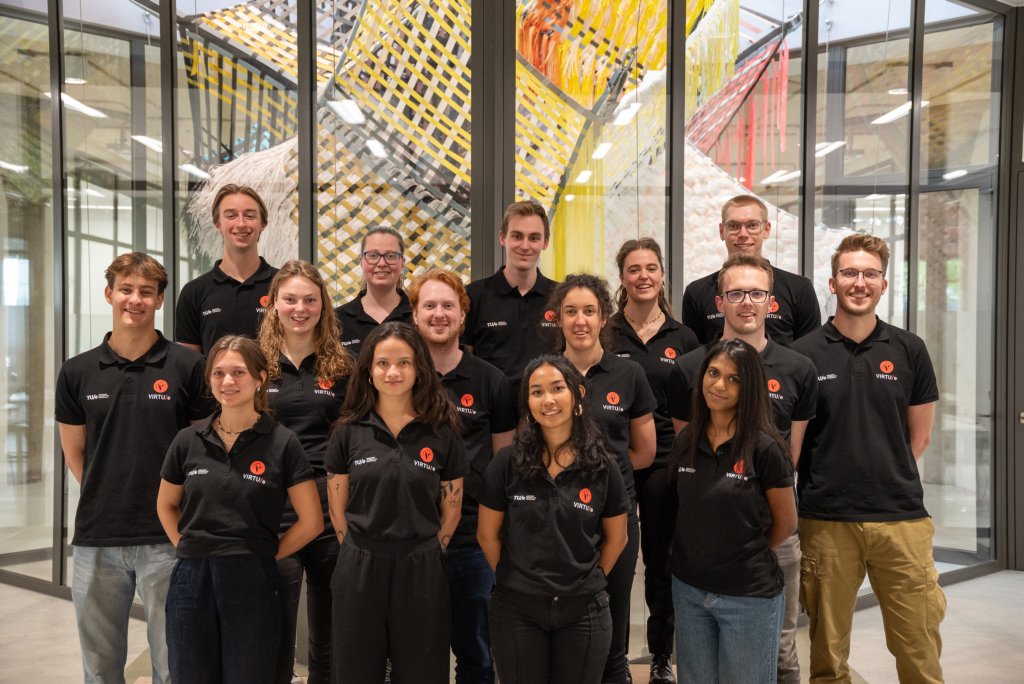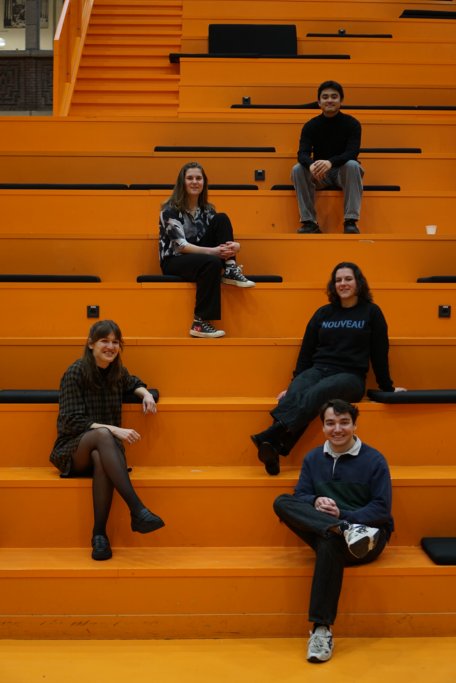Students build ingenious houses to solve construction problems
A large worksite and a cluttered office full of ambitious students. They are already building the houses of the future today. The goal: shaking the construction industry to its foundations.
 The office of the student team VIRTU/e at Eindhoven University of Technology (TU/e) is a busy place. Students discuss, design, and calculate. They are working on a concept to densify cities by adding extra floors to existing row houses, also known as optoppen. In this way, the team wants to contribute to solving the housing crisis. "There is limited space in the Netherlands to build additional residential neighborhoods. Moreover, these neighborhoods are increasingly far from the center of cities, while many people like to live close to the center," says Yorne Hermans, team manager of VIRTU/e. Building additional houses on top of existing ones could be a solution.
The office of the student team VIRTU/e at Eindhoven University of Technology (TU/e) is a busy place. Students discuss, design, and calculate. They are working on a concept to densify cities by adding extra floors to existing row houses, also known as optoppen. In this way, the team wants to contribute to solving the housing crisis. "There is limited space in the Netherlands to build additional residential neighborhoods. Moreover, these neighborhoods are increasingly far from the center of cities, while many people like to live close to the center," says Yorne Hermans, team manager of VIRTU/e. Building additional houses on top of existing ones could be a solution.
"Terraced houses are one of the most common kinds of homes in the Netherlands. By providing these houses with extra living layers, we create space for new residents," Hermans continues. It sounds simple, but it is anything but. There are many opportunities but also major obstacles. After all, are the foundations of the existing homes strong enough? How do people reach their high-ceilinged front doors? What about parking in the neighborhood? And will the neighborhood have enough facilities for all the new residents? These are all aspects that VIRTU/e is including in their completely new housing concept.
At the Delft University of Technology (TU Delft), students are also working on a new concept around housing and the built environment. For example, student team Flow Delft is working on a new home that no longer needs to be connected to the energy and water grid. Team manager Noor van Everdingen and Eva Egelmeers, responsible for strategy, explain their plans with students Flow Delft. "It is common knowledge that the energy grid is becoming overloaded, but almost no one knows that the problems surrounding the drinking water supply are just as urgent," states Van Everdingen.

She points out that new residential areas sometimes cannot be connected to the water grid. Therefore, Flow Delft wants to build a house that uses as little water as possible. In doing so, the students are looking at different facets of water. By reusing "gray water" - slightly contaminated wastewater from households - the students aim to consume 50% less drinking water. In addition to daily consumption, the students also look at virtual water. This is the water needed to produce building materials and furniture. They also looked at solutions to heavy rainfall and flood risk.
From concept to creation
Both teams were originally supposed to participate in the Solar Decathlon Europe next year. This competition challenges students from different countries to design the most efficient and innovative building possible. The organization has decided not to hold another edition for the time being. It's a disappointment, but it also gives the team space to do new things.
Student teams have an important role within universities. Both VIRTU/e and Flow Delft are part of the architecture faculties of 4TU.Built Environment, a partnership between the four technical universities in the Netherlands. Whereas scientists focus mainly on research for the future, student teams look at what is already possible now. Hermans: "Student teams have a unique position in the industry. We have ambitious plans and think outside the box. We sit at the table with companies, which allows us to ask critical questions while looking for a solution together. This is how we help the industry move forward."
Flow Delft will build a pavilion on the TU Delft campus next year. "It will serve as inspiration for scientists, staff, students, and visitors," Egelmeers says. VIRTU/e will work with the municipality to eventually build part of their concept in a neighborhood in Eindhoven. In doing so, they will get help from architectural firms and construction companies. "We want to inspire municipalities. Many row houses were built between 1950 and 1980. These are now in need of renovation. That offers opportunities to implement new concepts."
Build
What the new house of VIRTU/e will look like the students will determine together in the coming months. "That also very much depends on the building and the surroundings. Maybe we can remove the roof and then put up one or two floors with its entrance. But if that's not possible, we might be able to build an extra structure that can support the new floors," Hermans said. In addition to the exterior, the students are also looking at the inside of the house. "We could make some of the spaces in a house shared by more families. Not everyone needs a lot of space. By sharing certain spaces in the houses, we can use the space as efficiently as possible. The same, of course, applies to the outdoor spaces at the homes."
Durable material
Designing a house on top of an existing house was not challenging enough for the students. "The house runs entirely on renewable energy. We also want no additional carbon dioxide to be released during the construction and use of the building. We want to offset the emitted CO2 with biobased materials. In the same way, we also want to balance out the resources we use from the earth. The idea is that the material - for example, a wooden panel - is used in the house for as long as it takes the earth to grow another tree. That may not succeed for all raw materials, but at least we are attempting. With this, we can show the industry what is already possible."
At Flow Delft, they are equally ambitious. In their ultra-sustainable house, the students want to recycle all water, including highly polluted wastewater from toilets, also known as "black water. "That is very difficult in the Netherlands, given current regulations. We take up the challenge to see if there are possibilities to develop a cleaning system that is usable in a home and scalable for the future," Van Everdingen says.
Moving forward together
Ultimately, the pavilion on the TU Delft campus should serve as a place where students can meet up after lectures. And as befits good students, beer is also being considered. "One of the ideas is to set up a small brewery where we can brew beer from recycled water," Van Everdingen says, laughing. Still, they have a deadly serious message: things have to change. "Construction is a slow sector, many people cling to old thoughts, and there is little room for new ideas. We want to show what is already possible today."